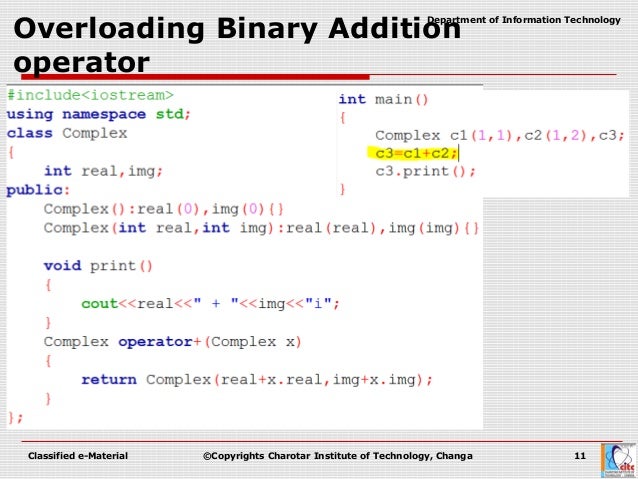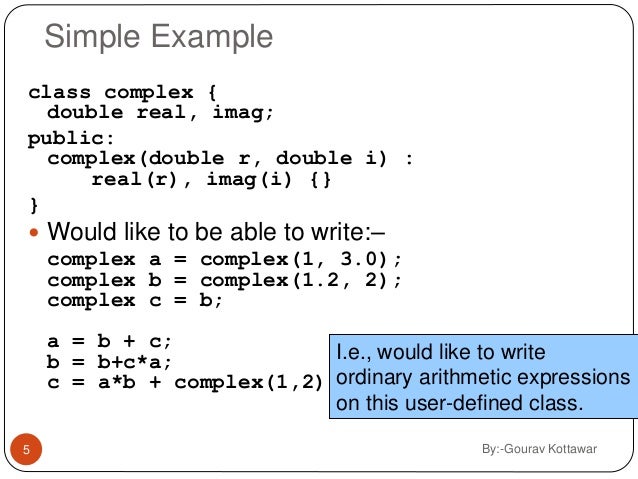
Explicit type casting. In implicit type conversion, the data type is converted automatically. There are some scenarios in which we may have to force type conversion. It requires a type casting operator. The general syntax for type casting operations is as follows: (type-name) expression Here, The type name is the standard 'C' language data. Aug 23, · A Cast operator is an unary operator which forces one data type to be converted into another data type. C++ supports four types of casting: 1. Static Cast 2. Dynamic Cast 3. Const Cast 4. Reinterpret Cast. Static Cast: This is the simplest type of cast which can be used. It is a compile time blogger.com does things like implicit conversions between types (such as int to float, or pointer to void /5. In the first line, currentUser["employer"] without any typecast is an optional AnyObject (aka unspecified) which doesn't know a + operator. In the second line, the string literal "employer" within the String interpolated expression causes a syntax error (which is fixed in Xcode beta 2).
✔ Typecast binary operator to optional type
In the lesson 4. The following example shows typecast binary operator to optional type int being converted into a double:. However, it does not know how to convert any of our user-defined classes. User-defined conversions allow us to convert our class into another data type. Take a look at the following class:. This class is pretty simple: it holds some number of cents as an integer, and provides access functions to get and set the number of cents.
It also provides a constructor for converting an int into a Cents. In some cases, this might not be true, but in this case, it does make sense. In the following example, we have to use getCents to convert our Cents variable back into an integer so we can print it using printInt :. If we have already written a lot of functions that take integers as parameters, our code will be littered with calls to getCentswhich makes it more messy than it needs to be.
Typecast binary operator to optional type make things easier, we can provide a user-defined conversion by overloading the int typecast. This will allow us to cast our Cents class directly into an int, typecast binary operator to optional type. The following example shows how this is done:. The compiler will first note that function printInt takes an integer parameter. Then typecast binary operator to optional type will note that variable cents is not an int.
Since we have, it will call our operator int function, which returns an int, and the returned int will be passed to printInt. You can provide user-defined conversions for any data type you wish, including your own user-defined data types! This allows us to convert a Dollars object directly into a Cents object! This allows you to do something like this:, typecast binary operator to optional type.
Still can't solve how to convert both ways from Dollars to Cents and vice versa. It is not as intuitive as copying the code from Cents and pasting it into Dollars. Heyin your last example of converting Dollar instance to CentsI actually tried to add a typecast operator in Cents class to convert it into Dollar but I got error So I declared the Dollar class by following: class Dollar ; and then the rest of the codebut still compiler said that Dollar class is not complete even though I've added every necessary thing into Dollar class.
Is it not possible just to add typecast operator in both Cents and Dollar for each other? Also in the general sense of a function prototype, user-defined conversions do not have a return type but the function identifier itself is a type-name so doesn't it check with it that what we are returning from the function is atleast implicitly convertible to that? Also in the general sense of a function prototype, user-defined conversions do not have a return type but the function identifier itself is a type-name so doesn't the compiler check that what we are returning from the function is atleast implicitly convertible to that type-name?
Normal function rules apply, typecast binary operator to optional type. You're not using your typecast operator. I have a question. MyClass to an int and will use the normal operator e. I guess it will be the operator, because the typecast is only done after it checks if there is a matching operator function, typecast binary operator to optional type, but I'm not entirely sure.
This only happens when I add the overloaded type cast operator int const. When I remove the overloaded type cast, it compiles. Why isn't this ambiguous without the type cast as there are two functions member and normal when my parameters are both cents. This raises another question. When I'm not overloading typecasting and I have overloaded member and normal functions:.
Is there an order for which type of function is executed? You mentioned that this is an example of an int being converted to a double, yet because it is done with uniform initialization, it causes an error.
Perhaps use copy assignment instead? Name required. Email will not be published required. Save my name, email, and website in this browser for the next time I comment. Enter your search terms Submit search form. By Alex on October 30th, last modified by Alex on December 21st, PrintCents dollars. PrintDollars cents. The following example shows an int being converted into a double: 1 2.
Admin Log in.
Decimal to Binary conversion using bitwise shift operator C++ program
, time: 5:58✷ Typecast binary operator to optional type

Nov 05, · (-) operator change the functionality to its member function. Note: d2 = -d1 will not work, because operator-() does not return any value. Overloading Binary Operator: In binary operator overloading function, there should be one argument to be passed. It is overloading of an operator operating on two operands/5. Explicit type casting. In implicit type conversion, the data type is converted automatically. There are some scenarios in which we may have to force type conversion. It requires a type casting operator. The general syntax for type casting operations is as follows: (type-name) expression Here, The type name is the standard 'C' language data. reinterpret_cast converts any pointer type to any other pointer type, even of unrelated classes. The operation result is a simple binary copy of the value from one pointer to the other. All pointer conversions are allowed: neither the content pointed nor the pointer type itself is checked. It can also cast pointers to or from integer types.
No comments:
Post a Comment